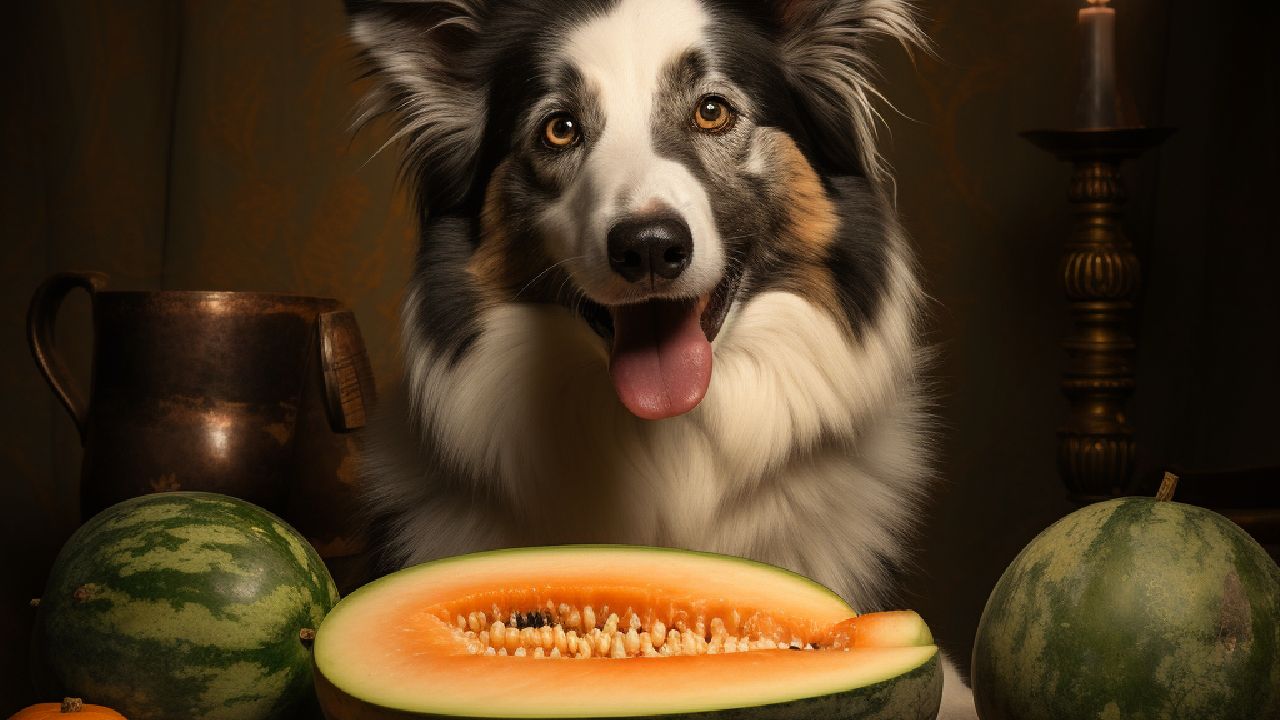Have you ever enjoyed a juicy slice of cantaloupe and wondered if you could share this tasty treat with your furry friend? You’re not alone! Many dog parents are curious about what human foods are safe for their pets. Cantaloupe, a hydrating fruit packed with nutrients, can indeed be a healthy option for dogs, but it’s essential to serve it properly.
Whether you’re looking for a refreshing summer snack for your pet or curious about the nutritional benefits, read on for everything you need to know about dogs and cantaloupe.
Can Dogs Eat Cantaloupe?
The short answer is yes, dogs can eat melon. However, like any good narrative, there’s more to the story than a mere affirmative. The pros and cons of melon for dogs, the best ways to serve it, and the possible warnings are all little segments of our journey together today. So, let’s embark on this juicy adventure!
“It’s always important to check for the source of the melon ( where you are getting it from). Unfortunately, they can be carriers of some bacteria, especially listeriosis. It was reported the listeriosis outbreak was due to melon ingestion in the USA.” – Veterinarian Mykhailo Ozmenchuk.
Nutrient Powerhouse
Cantaloupe is more than just a tasty treat; it’s a nutrient powerhouse that can offer several health benefits for your dog:
- Vitamin A: Vital for maintaining healthy vision, skin, and coat.
- Vitamin B6: Supports enzymatic reactions essential for metabolism and immune function.
- Vitamin C: Although dogs produce Vitamin C, extra sources can boost the immune system, especially in older or stressed dogs.
- Water Content: Cantaloupe is about 90% water, making it an excellent way to hydrate your dog during hot days. Learn more about dehydration in dogs to be always ready.
Cantaloupe’s Hydration Boost in Summer
Considering the high water content of cantaloupe (around 90%), melons can be deemed a ‘liquid snack.’ On sweltering summer days, they can be a lifesaver.
Not only does it quench thirst, but it also prevents heat strokes and dehydration-related issues in dogs. Consider melon slices natural water reservoirs, keeping your pup hydrated and cool.
Digestive Benefits
Anyone who has witnessed a dog suffering from digestive issues knows how discomforting it can be for the pet. Melons come to the rescue here! They’re a good source of dietary fiber, which ensures:
- Regular Bowel Movement: The fiber aids in softening the stool, preventing constipation.
- Balanced Gut Flora: Melon’s soluble fiber acts as a prebiotic, supporting beneficial bacteria in the dog’s gut.
- Digestive Harmony: can mitigate issues like diarrhea, ensuring a happy and playful pup.
Melons as a Free Radical Fighters
Melons are not just about hydration and vitamins; they are also rich in antioxidants, especially beta-carotene in cantaloupes. Antioxidants play a pivotal role in:
- Combatting Free Radicals: These harmful compounds can accelerate aging and increase the risk of diseases. Antioxidants from melons neutralize these radicals, ensuring a healthier pup.
- Anti-inflammatory Properties: Chronic inflammation can lead to various health problems in dogs. The antioxidants in melons have anti-inflammatory properties that can help in reducing inflammation.
- Strengthening Immune Response: By reducing oxidative stress in the body, antioxidants pave the way for a more robust immune system.

Serving Melons to Dogs
As pet parents, we always look for what’s best for our fur babies. When introducing new foods like melon into their diet, it’s crucial to prioritize their safety.
So, how should you serve melon to ensure your canine companion gets the most out of this sweet treat without any drawbacks? Let’s delve deeper into the art and science of melon serving for dogs.
Seed Safety
While the fleshy part of melons is a treat, their seeds are a different story. They can be a choking hazard, especially for smaller breeds. But there’s more:
- Digestive Disturbances: Ingesting seeds might cause an upset stomach or lead to digestive tract blockages. It’s a risk not worth taking.
- Potential Toxins: Some seeds, especially those of bitter melons, contain small amounts of toxins that can be harmful if consumed in large quantities.
Ensure that the melon slice you’re serving lacks seeds to guarantee your dog’s safety.
Cantaloupes Moderation Key
It’s easy to get carried away, especially when your dog adores the taste of melon. But moderation is key.
- Calorie Count: Treats should only make up 10% of a dog’s daily caloric intake. While melon is low in calories, it can add up if given excessively.
- Trial and Error: Each dog is an individual. Some might adore melon; others might not care for it. Starting with a small piece helps gauge their interest and ensures no adverse reaction.
Make Specific Portions
Serving size is essential, not just from a quantity perspective but also from a safety standpoint.
Size-Specific: If you have a giant dog, they might handle bigger chunks without a problem. However, even a slightly oversized piece can pose a choking risk for smaller breeds.
Texture Matters: Melons are slippery. Cutting them into manageable, bite-sized pieces ensures your dog can grip and chew the fruit properly.
Avoid Whole Slices: Never give your dog an entire slice. Not only is there a risk of them trying to swallow it whole, but there’s also the danger of ingesting the rind.
Most common melons, like cantaloupe and watermelon, are safe for dogs. However, it’s best to stick to those familiar varieties and constantly research a specific type of melon before introducing it to your pet. For more information on another popular melon, read about whether dogs can eat watermelon.
Watch for Allergies
While melons are a delicious treat, and many dogs would love to enjoy a slice or two, it’s crucial to recognize the potential downsides.
Like humans, dogs, too, can have allergies; melons are on that list for some canines. Being observant is essential if introducing melon to your dog’s diet for the first time. Here’s what you should look out for:
- Immediate Reactions: Watch for any sudden signs of distress, including excessive itching, swelling, or difficulty in breathing, shortly after they’ve consumed melon.
- Gastrointestinal Disturbances: Melon allergies might manifest as vomiting, diarrhea, or excessive gas. If you notice these symptoms, consult your vet.
- Behavioral Changes: Unusual behaviors, like excessive licking, scratching, or a sudden lack of energy post-melon munching, can also indicate an allergic reaction.

Avoid the Rind
Melon rinds are fibrous and tough, making it challenging for a dog’s digestive system to break down. Consuming large amounts can lead to blockages or gastrointestinal discomfort.
The rind might have pesticide residues if you’re not buying organic melons. Even if you wash the melon, traces of these chemicals could linger, potentially harming your dog.
Especially for smaller dogs, bigger chunks of rind can pose a choking threat.
The Danger of Serving with Milk
Combining melon with milk might sound quirky, but there’s reason to approach this mix with caution:
- Lactose Intolerance: Dogs can become lactose intolerant, especially as they age. Milk or dairy products can lead to stomach cramps, gas, and diarrhea in such dogs.
- Digestive Enzymes: Melon contains certain enzymes that might not play well with the proteins in milk, potentially causing digestive discomfort when ingested together.
- Nutritional Imbalance: Dogs have specific dietary needs, and while occasional treats are fine, regularly combining foods like melon and milk might lead to an imbalance in their nutrient intake.
Conclusion
Melon stands out as a natural dog treat, so the next time they eye your slice, feel free to share a bite. After all, not every pup might dance with joy at the sight of melon, but it’s a refreshing treat for those who do. The key is to balance variety and safety in their diet. While exploring new treats like melon for your dog, staying prepared for unexpected health issues is crucial.
Dogs can indeed enjoy a slice of melon, given its health benefits. But remember, the way it’s served matters. Always offer it in safe, manageable amounts, and watch out for any unusual reactions.
Consider exploring dog health insurance options to ensure you’re ready for vet visits, giving you peace of mind while enjoying fun snack times together.

FAQs
How often can my dog eat cantaloupe?
Cantaloupe should be an occasional treat, not a daily supplement. Once or twice a week is a good rule of thumb.
Are there any dogs that shouldn’t eat cantaloupe?
Due to its sugar content, dogs with diabetes or overweight dogs should avoid cantaloupe. Always consult with your vet first.
Can puppies eat cantaloupe?
Yes, puppies can eat melon. However, due to their smaller size, ensuring they are served in tiny, manageable pieces and always in moderation is even more crucial.
Ensuring your puppy’s comfort and safety extends beyond their diet. Discover the best dog crates to provide a secure and cozy space for your furry friend at home or while traveling.
Are there any specific types of melon that dogs should avoid?
Most common melons, like cantaloupe and watermelon, are safe for dogs. However, it’s best to stick to those familiar varieties and constantly research a specific type of melon before introducing it to your pet.
How often can I give my dog melon?
Melon should be treated as a special snack, not a regular part of your dog’s diet. Small amounts once or twice a week are a good guideline.
Should I be alarmed if my dog accidentally eats melon seeds or rind?
A few accidental seeds or a small piece of rind shouldn’t be a major concern, but monitor your dog for any signs of gastrointestinal distress. If they consumed a large amount, consult your vet.
How can I check if my dog is allergic to cantaloupe?
Initially, introduce melon in a minimal quantity and observe for unusual symptoms like itching, swelling, or digestive issues. If in doubt, always consult with a veterinarian.
Remember to introduce it gradually, serve in moderation, and prepare it safely without seeds or rinds. By following these guidelines, you can ensure your furry friend enjoys this sweet snack without risks.






never thought about sharing it with my dog…
Cantaloupe is a favorite in our house